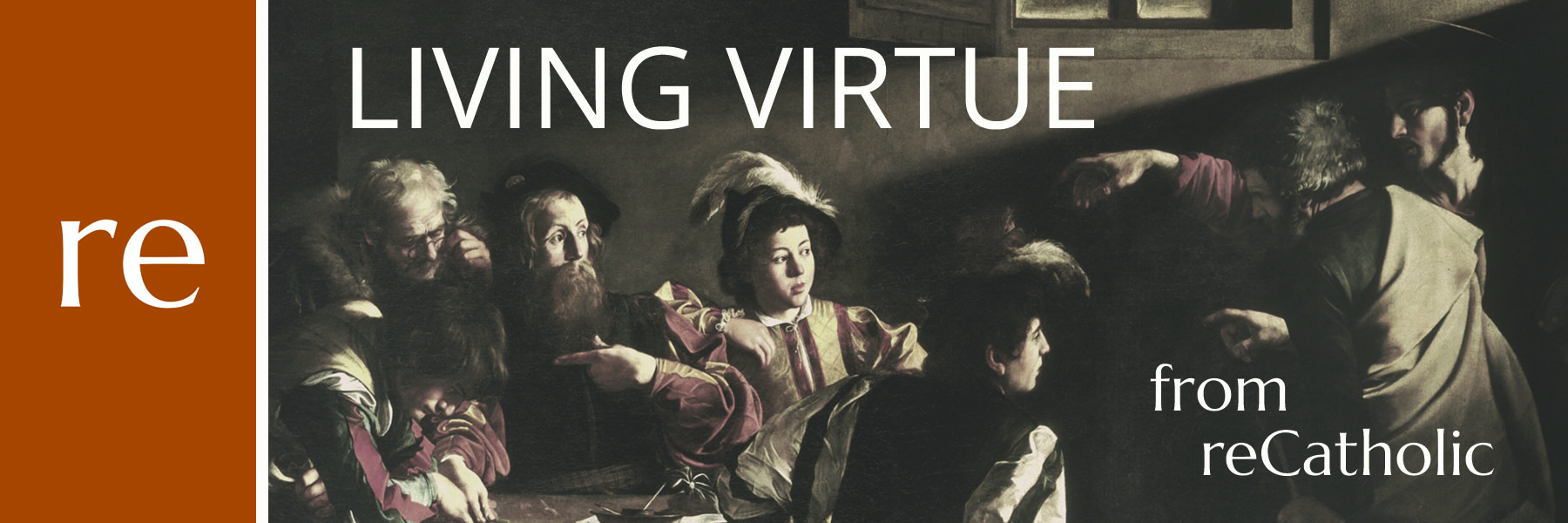
Virtue – Temperance
Temperance is the virtue that helps us live with balance, especially in the things we really enjoy.
1. Understand Temperance
What is Temperance?
God created us so that having a body is part of what it means to be human. Our five senses are the way we experience the rest of creation, and they allow us to experience both pain and pleasure.
Naturally, we love pleasure, we definitely prefer it over pain. We want more and more of it. We prefer ice cream over broccoli, we’d rather be at the beach than at work, and we normally choose the things in life that are easier, tastier and that make us laugh.
There’s nothing wrong with bodily pleasures, however, if we are not temperate, these tendencies can carry us beyond what is appropriate and lead us to sin.
This is where temperance comes in. By this virtue, we keep our tendency toward pleasure in check, and we also learn to enjoy the good things of life according to God’s plan for us, with detachment and gratitude.
From the Catechism
CCC 1838 Temperance moderates the attraction of the pleasures of the senses and provides balance in the use of created goods.
The Virtue Lived – St. Augustine

Augustine was born in the year 354 in what is now modern-day Algeria. Even though his mother Monica was a Christian, during much of his life Augustine did not believe in God.
Passionate about his education, he eventually became a teacher. Although he excelled in his studies and work, he was often dissatisfied and longed to find deeper meaning in life. Augustine’s lack of purpose led him to live without commitment. One of his greatest struggles was to live chastely.
There was a turning point one day, when Augustine heard St. Ambrose preaching a sermon. He was so inspired that he asked the saint to become his mentor. Ambrose’s guidance and the writings of the saints challenged Augustine to renounce his unchaste practices.
Although he was convinced that he needed to change, his habits were so ingrained that it took him a long time to break free. This inner struggle can be seen through the way he prayed: “Give me chastity and continence, but not yet.” Temperance wasn’t easy for him. It was only through prayer and with great effort that he eventually conquered his vices and embraced God’s plan for his life. Later he was even ordained a priest.
Augustine’s passion for learning and rhetoric bore fruit through his preaching and writing and his desire for loving commitment was fulfilled through his dedication to the Church as a priest. Augustine became well known through his extensive preaching and writings which eventually led him to become a bishop and leader in the Church.
2. Virtue In My Life
Spiritual Questionnaire
Questions geared towards self knowledge and personal growth
Struggles
- Am I excessive in the enjoyment of eating or drinking? Do I understand that my body is a gift of God and that I am responsible for taking care of my health?
- Do I accept the Church’s teaching that drunkenness, or the use of drugs, is sinful, because of how it makes me less free, and also more likely to do evil or shameful things? Do I sometimes try to lose control?
- Do I treat my body, or the bodies of others with modesty and respect, both in person or online? Do I avoid images and videos that treat persons as objects to be used or looked at, and not as God’s children to be loved and respected?
- Do I sometimes have an attitude of trying to enjoy as much as possible “without sinning”, instead of making the effort to be the best person that I can? Do I ever think to myself that I would be happier if I didn’t have to follow Jesus’ teachings?
Highlights
- Can I think of any examples of good holy things that I have learned to enjoy and look forward to? Things that maybe other people laugh at or criticize? How was I able to achieve this good habit?
- Can I remember a time that I ate too much junk food or sweets? How did that make me feel while I was enjoying it? How did I feel afterwards? Do I realize how similar bad actions are, feeling enjoyable in the moment, but making me sad and empty afterwards?
- In areas where it’s easy for me to practice self control, compared to areas where I am tempted to lose control: where does it seem like I am more free?
Prayer
- When tempted with something sinful that I have fallen into in the past, do I humbly recognize my weakness and turn to God for assistance?
- Do I regularly go over those areas in my life where I am weakest, in order to challenge myself and prayerfully consider strategies to grow stronger?
- When I am enjoying good and beautiful things, do I often thank God for creating me capable of pleasure and praise Him for His love?
- Do I meditate often on God’s love and how he wants everyone to be truly happy? Do I renew my absolute trust that His laws are the perfect way to live a balanced and fulfilled life?
3. Growing In Virtue
A Prayer for Virtue
Jesus, as a man, You showed us that creation is good. Help me to imitate Your example of balance and moderation. Let me only enjoy the beauty and goodness of this world as a path that leads me to You. Amen.
St. Augustine // Pray for us!
Practical Tips for Living This Virtue
- Avoiding the near occasion of sin is easier than saying no to sin once you are there. Review your life and make a prayerful decision to avoid any places or even people who lead you to unworthy pleasures.
- Do you struggle with overeating as a way to deal with stress? Well, a simple remedy is to make a list of good, healthy ways to deal with stress, and to turn toward those instead, when you are tempted to snack without control. Things like taking a walk, reading a book, writing a letter to a friend, painting a picture, playing an instrument, etc. Make your list concrete. Teach yourself to turn to healthy pastimes.
- Having an accountability partner who you can trust can be essential to staying strong. Make it a practice to rely on a friend when you are tempted, and to pray for each other.
- There are often very practical ways to challenge yourself or to limit your own access to the pleasures that lead you astray:
- Tempted to eat chocolate? Grab a carrot instead.
- Drinking a few too many beers? Challenge yourself to drink a bottle of water in between each drink at parties.
- Addicted to social media on your phone? Try removing all apps from your phone, and only check on your computer at home.
4. Other Resources
The Catechism
1809 Temperance is the moral virtue that moderates the attraction of pleasures and provides balance in the use of created goods. It ensures the will’s mastery over instincts and keeps desires within the limits of what is honorable. the temperate person directs the sensitive appetites toward what is good and maintains a healthy discretion: “Do not follow your inclination and strength, walking according to the desires of your heart.”72 Temperance is often praised in the Old Testament: “Do not follow your base desires, but restrain your appetites.”73 In the New Testament it is called “moderation” or “sobriety.” We ought “to live sober, upright, and godly lives in this world.”74
To live well is nothing other than to love God with all one’s heart, with all one’s soul and with all one’s efforts; from this it comes about that love is kept whole and uncorrupted (through temperance). No misfortune can disturb it (and this is fortitude). It obeys only (God) (and this is justice), and is careful in discerning things, so as not to be surprised by deceit or trickery (and this is prudence).75
2290 The virtue of temperance disposes us to avoid every kind of excess: the abuse of food, alcohol, tobacco, or medicine. Those incur grave guilt who, by drunkenness or a love of speed, endanger their own and others’ safety on the road, at sea, or in the air.
2341 The virtue of chastity comes under the cardinal virtue of temperance, which seeks to permeate the passions and appetites of the senses with reason.
2407 In economic matters, respect for human dignity requires the practice of the virtue of temperance, so as to moderate attachment to this world’s goods; the practice of the virtue of justice, to preserve our neighbor’s rights and render him what is his due; and the practice of solidarity, in accordance with the golden rule and in keeping with the generosity of the Lord, who “though he was rich, yet for your sake . . . became poor so that by his poverty, you might become rich.”189
2517 The heart is the seat of moral personality: “Out of the heart come evil thoughts, murder, adultery, fornication….”304 The struggle against carnal covetousness entails purifying the heart and practicing temperance:
Remain simple and innocent, and you will be like little children who do not know the evil that destroys man’s life.305
2521 Purity requires modesty, an integral part of temperance. Modesty protects the intimate center of the person. It means refusing to unveil what should remain hidden. It is ordered to chastity to whose sensitivity it bears witness. It guides how one looks at others and behaves toward them in conformity with the dignity of persons and their solidarity.
Quotes From Saints
Wine is for mirth, not for madness. – John Chrysostom
Inordinate love of the flesh is cruelty, because under the appearance of pleasing the body, we kill the soul. – Bernard of Clairvaux
Love the knowledge of the Scriptures and you will not love the errors of the flesh. – Jerome
God is the Creator of the human body as well as the soul. Neither of these is evil, nor does God hate either of them: for He hates none of the things that He has made. – Augustine of Hippo
If there is anyone who is not enlightened by this sublime magnificence of created things, he is blind. … If there is anyone who, seeing all these works of God, does not praise Him, he is dumb; if there is anyone who, from so many signs, cannot perceive God, that man is foolish. – Bonaventure
Don’t say that you have a chaste mind if you have unchaste eyes, because an unchaste eye is the messenger of an unchaste heart. – Augustine of Hippo
Drunkenness is the ruin of reason. It is premature old age. It is temporary death. – Basil the Great
Videos
What is the Sin of Gluttony? – Fr. Mike Schmitz
What Is Temperance? – Fr. James Brent, O.P.
Videos en Español
Virtud de la templanza – Virtudes Humanas
Footnotes
72 Sir 5:2; cf. 37:27-31.
73 Sir 18:30.
74 Titus 2:12.
75 St. Augustine, De moribus eccl. 1, 25, 46: PL 32, 1330-1331.
189 2 Cor 8:9.
304 Mt 15:19.
305 Pastor Hermae, Mandate 2, 1: PG 2, 916.